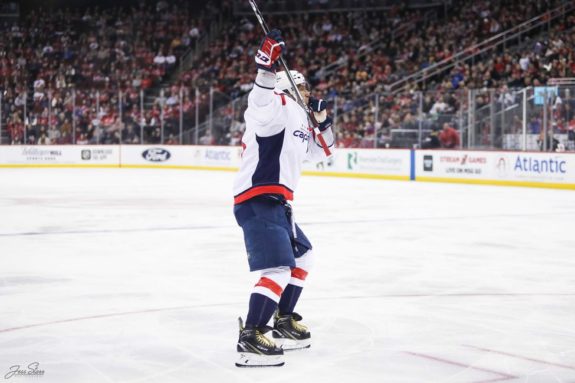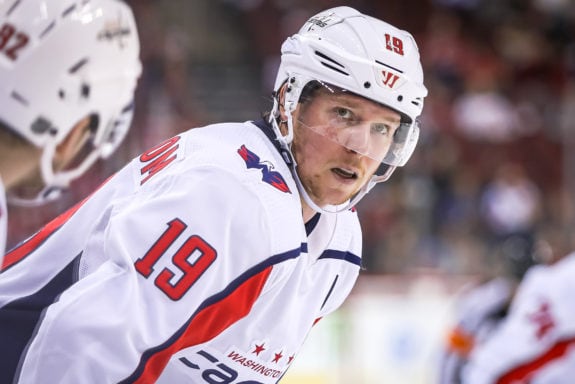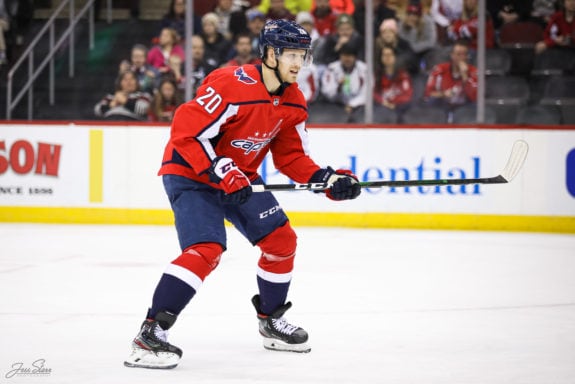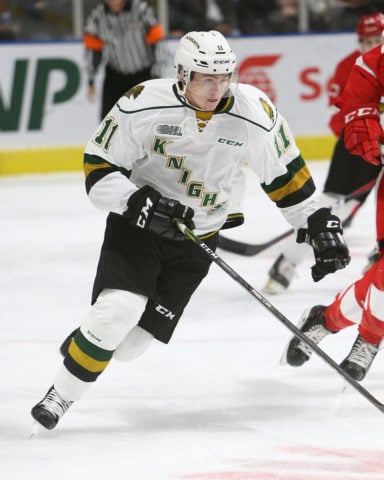
 Jack Dawkins
The Hockey Writers
Jack Dawkins
The Hockey Writers
49
Reads
0
Comments
Capitals Face Tough Roster Decisions
It has been reported that the NHL salary cap might be effectively frozen at $81.5 million until 2023. During that time period, Alex Ovechkin’s current contract will expire, several players will hit free agency, and drafted prospects will be trying to break into the NHL. This puts the Washington Capitals into an interesting position with some very intriguing questions to answer.
Would Ovechkin Take a Hair Cut?
The 2020-21 season will be the final year in a 13-year, $124 million contract that Ovechkin signed in January 2008. It carries an annual cap hit of $9,538,462. At the age of 34, Ovechkin shows no signs of slowing down. His 0.71 goals per game this season was his best goal production average since 2008-09, when he was 23 years old. Barring a major injury, it would not be unreasonable to expect Ovechkin to continue to produce goals at, the very least, a career average rate (0.61 goals per game) for at least the next few years.

The obvious question should have an obvious answer. It seems a foregone conclusion that if Ovechkin wants to continue his NHL career beyond the 2021 season, he would want it to be in Washington. His charity work with the American Special Hockey Association in the Washington, D.C. area is well documented. He has made Washington his home and he will certainly be the last player to ever wear the No. 8 for the Capitals. It seems obvious, but the almighty dollar has an unfortunate way of taking obvious and simple concepts and complicating them.

It’s a fair question to ask if the Capitals can afford to continue to pay an aging superstar the kind of money he made in his prime. That question could be further complicated by the big contract that was just given to Ovechkin’s long-time centerman, Nicklas Backstrom. From 2020-21 until 2024-25; Backstrom will account for $9.2 million against the cap.
Related: Capitals Ready for One Last Cup Run With This Roster
There’s a fine line that has to be walked between a player taking a discount to stay with a team, and a franchise being “disrespectful” in the dollar amount they offer to that player. There’s a lot more potentially wrapped up in this contract than meets the eye on the surface. How low can Ovechkin’s salary be before it’s “disrespectful” to him? Is Ovechkin willing to take any kind of a pay cut at all in order to continue his career in Washington?
Expensive Depth or Entry-Level Contracts?
Another decision the Capitals will have to make involves their depth players. Currently, they employ Lars Eller, Carl Hagelin, Richard Panik and Garnet Hathaway all in depth roles on the team. Each of those players are signed to contracts that do not expire until 2023, and have a combined cap hit of $10.5 million. This means the Capitals have one of the most expensive sets of bottom-six forwards in the league.

Many successful NHL teams are currently filling their bottom-six with players on entry-level contracts. There are a few forwards in the Capitals prospect pool that look like they could change this trend in the coming years. However, four of the six available bottom-six forward spots are currently occupied by players, who range in age from 28 to 31.
Related: Cup-Winning Capitals – Where Are They Now?
A time period of three years with minimal salary cap growth means that the Capitals must decide if their fortunes are best served by keeping their pricey, veteran forward depth, or attempting to move ahead with younger, cheaper options. If it is the latter, then perhaps the Caps need to consider their time table for making some moves.
Is the 2020 Offseason the Time to Make Moves?
This season is likely to be the last one that sees Braden Holtby in a Capitals’ uniform. It also seems unlikely that the Capitals will be able to keep either Brendan Dillon or Radko Gudas beyond this season. Ilya Kovalchuk is a complete unknown. If they do not keep Holtby, Dillon and Gudas, the Capitals will have approximately $7.5 million in cap space available to them.
Related: Capitals’ Top 5 U-20 Prospects
With Connor McMichael likely to make a big push for a roster spot and some salary space to play with, it might be in the Capitals’ best interests to try to move Eller this offseason. Panik and Hagelin could also see themselves supplanted by younger, less expensive options. This would free up additional cap space that could allow Washington to upgrade their roster in other places. Simply trading Eller and Panik could leave the team with over $13 million in salary-cap space. That kind of space, with all the core players locked up, could allow the Capitals to chase a bigger fish than anybody would currently be expecting them to.

The Capitals could be at a turning point with the salary cap stagnating at $81.5 million until 2023. The team has many key components under contract until at least the end of the 2023 season, the exceptions to that being Vrana and Ovechkin. How the franchise handles Ovechkin’s next contract and what decisions they make regarding their roster composition could see them cruising through rough waters while other teams struggle to manage their cap situations. This would put them in a prime position to chase down a second Stanley Cup championship.
The post Capitals Face Tough Roster Decisions appeared first on The Hockey Writers.
Popular Articles

















































 Blackhawks Chicago
Blackhawks Chicago Panthers Florida
Panthers Florida Penguins Pittsburgh
Penguins Pittsburgh Rangers New York
Rangers New York Avalanche Colorado
Avalanche Colorado Kings Los Angeles
Kings Los Angeles Maple Leafs Toronto
Maple Leafs Toronto Bruins Boston
Bruins Boston Capitals Washington
Capitals Washington Flames Calgary
Flames Calgary Oilers Edmonton
Oilers Edmonton Golden Knights Vegas
Golden Knights Vegas Flyers Philadelphia
Flyers Philadelphia Senators Ottawa
Senators Ottawa Lightning Tampa Bay
Lightning Tampa Bay Red Wings Detroit
Red Wings Detroit Islanders New York
Islanders New York Sabres Buffalo
Sabres Buffalo Devils New Jersey
Devils New Jersey Hurricanes Carolina
Hurricanes Carolina Blue Jackets Columbus
Blue Jackets Columbus Predators Nashville
Predators Nashville Stars Dallas
Stars Dallas Jets Winnipeg
Jets Winnipeg Wild Minnesota
Wild Minnesota Blues St. Louis
Blues St. Louis Mammoth Utah
Mammoth Utah Ducks Anaheim
Ducks Anaheim Canucks Vancouver
Canucks Vancouver Sharks San Jose
Sharks San Jose






